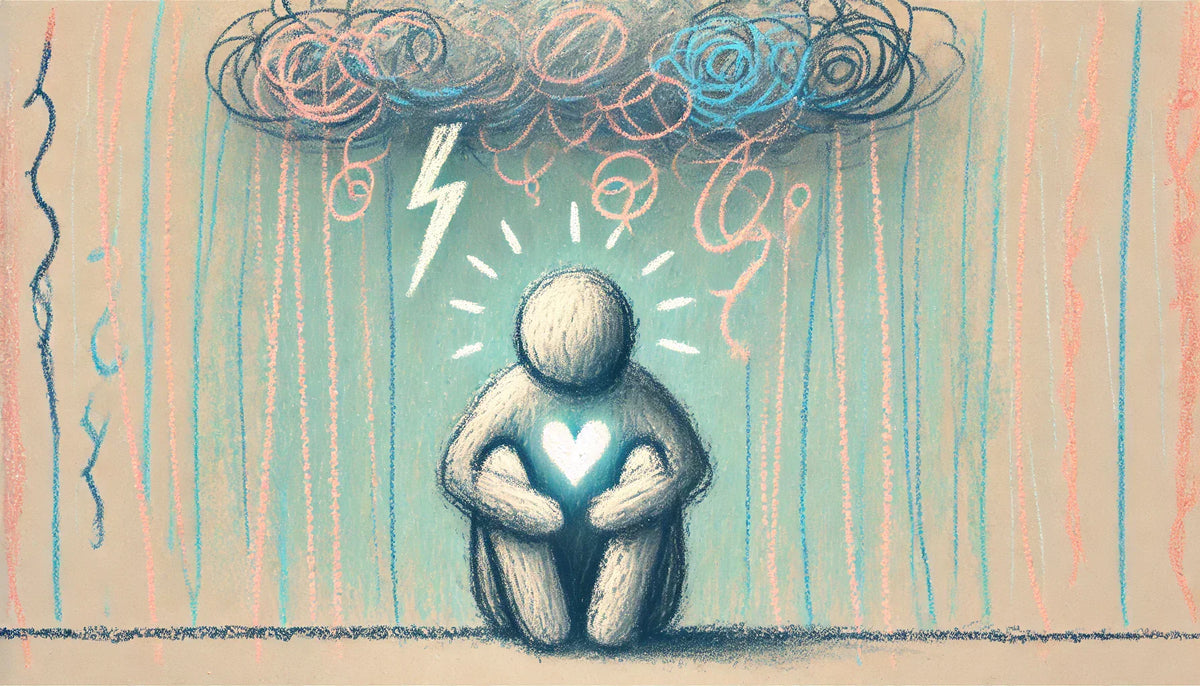Jesus and Mental Health: What the Gospels Reveal About Emotional Wellness
Faith and Mental Health—A Needed Conversation
Mental health is no longer a hidden conversation. More people today—inside and outside the Church—are recognizing the importance of emotional well-being. But for many Christians, the topic still feels foreign or even taboo.
Does the Bible say anything about mental health?
Can someone love Jesus and still struggle emotionally?
Yes. Absolutely.
And the most powerful proof comes from Jesus Himself.
The Gospels reveal that Jesus was not emotionally detached or robotic. He was deeply present, fully human, and emotionally engaged. He showed us what emotional wholeness looks like—even in the midst of sorrow, pressure, and pain.
This post isn’t a replacement for professional mental health care. Rather, it’s an invitation to see mental and emotional wellness as deeply spiritual—and deeply biblical.
💔 Jesus Had Emotions—And He Expressed Them Openly
One of the most comforting truths in the Gospels is that Jesus felt real emotions. He didn’t hide His feelings, nor did He shame others for theirs.
✔️ Jesus Wept – Grief and Compassion
The shortest verse in the Bible—“Jesus wept” (John 11:35)—is also one of the most profound. When His friend Lazarus died, Jesus knew He would raise him from the dead. Still, He allowed Himself to fully feel the grief of loss and the pain of those mourning around Him.
That tells us something important:
Feeling deeply doesn’t mean you lack faith.
✔️ Jesus Was Troubled – Anguish and Sorrow
In the Garden of Gethsemane, Jesus was overwhelmed with sorrow.
“My soul is overwhelmed with sorrow to the point of death…” – Matthew 26:38
The weight of what He was about to endure crushed Him emotionally. Luke 22:44 tells us He was in such anguish that He sweat drops of blood—a real condition known as hematidrosis, caused by extreme stress.
Jesus understands anxiety.
He understands sorrow.
And He expressed it honestly.
✔️ Jesus Felt Anger – Righteous Indignation
In Mark 11:15–17, Jesus drove out money changers from the temple with authority and passion. His anger wasn’t sinful—it was righteous, directed at injustice and spiritual abuse.
Emotion isn’t the enemy. Emotion is part of being human.
And Jesus, the perfect human, felt them all.
💬 Jesus Encouraged Emotional Honesty with God
Jesus didn’t suppress emotion—and He didn’t expect others to either. He taught us to bring our full selves before God, even when it’s messy.
In the garden, Jesus didn’t pretend to be okay. He told the Father exactly how He felt and what He wanted:
“Take this cup from me…” (Mark 14:36)
But He also surrendered to the Father’s will:
“…yet not what I will, but what You will.”
This balance—honesty and surrender—is a beautiful model for prayer. God doesn’t want performative faith. He wants your real heart.
The Psalms are full of this kind of raw honesty. David asked, “Why, Lord, do You stand far off?” (Psalm 10:1) and later declared, “You are my hiding place” (Psalm 32:7). Both were true. Our emotions are part of the journey of faith—not a detour from it.
👀 Jesus Saw the Hurting—and Stopped
Over and over again, Jesus stopped for hurting people—not just to heal them physically, but to care for them emotionally.
✔️ The Bleeding Woman – Restoring Dignity
In Luke 8:43–48, a woman who had been bleeding for 12 years touched Jesus’ robe. She hoped to go unnoticed, but Jesus stopped, looked her in the eye, and said, “Daughter, your faith has healed you.”
He didn’t just heal her body—He restored her identity and dignity.
✔️ The Samaritan Woman – Listening Without Judgment
In John 4, Jesus talked to a Samaritan woman alone at a well—a cultural taboo. He saw her past, her pain, and her thirst for meaning. And He offered living water, not condemnation.
Jesus always saw beneath the surface.
He responded to the heart, not just the symptoms.
Need help creating faith-filled content for your blog or ministry? I offer Christian blog writing, devotional writing, and SEO content services.
Work with me here →🌄 Jesus Practiced Rest and Rhythms of Renewal
In a culture obsessed with productivity, we forget that Jesus often withdrew to rest—even when there were pressing needs.
“But Jesus often withdrew to lonely places and prayed.” – Luke 5:16
“Very early in the morning…He went off to a solitary place…” – Mark 1:35
Jesus was constantly surrounded by crowds, demands, and hurting people. Yet He still took time to recharge His spirit and body. That wasn’t laziness—it was wisdom.
If Jesus needed rest, how much more do we?
✔️ Sabbath Rest Is Emotional Wisdom
God commanded Sabbath not as a burden, but a blessing—a rhythm to remind us we’re not machines. Emotional health requires margin, space, and stillness. Jesus embraced that rhythm.
🤗 Jesus Invited People to Bring Their Burdens
Perhaps one of Jesus’ most comforting invitations is found in Matthew 11:
“Come to me, all you who are weary and burdened, and I will give you rest…”
“For my yoke is easy and my burden is light.” – Matthew 11:28–30
Jesus didn’t say, “Come to me once you’ve fixed yourself.” He said, “Come now.”
To the tired. The burned out. The emotionally exhausted.
Mental health struggles aren’t spiritual failures—they’re opportunities to come closer to Christ.
🛐 Jesus Modeled Boundaries and Emotional Health
Even though Jesus was always compassionate, He didn’t say “yes” to everyone.
✔️ He Walked Away from Crowds (Luke 4:42–43)
Jesus left healing lines to preach elsewhere, showing that He didn’t let people’s demands override God’s mission.
✔️ He Said “No” to Pressure
His family once tried to pull Him away from His ministry. He said His true family were those who did God’s will (Mark 3:33–35). That’s not emotional coldness—it’s clarity.
Emotional health includes setting boundaries, not out of selfishness, but so we can stay aligned with God’s purpose.
🤲 What the Church Can Learn from Jesus About Mental Health
As followers of Jesus, we’re called to reflect His compassion—not just in theology, but in presence.
Here’s how the Church can model emotional wellness like Jesus:
✅ Normalize the conversation – Mental health isn’t taboo in Scripture or the Kingdom.
✅ Offer a listening ear – Be quick to listen, slow to speak (James 1:19).
✅ Pray without pressure – Prayer is powerful, but it’s not a substitute for therapy.
✅ Encourage professional help – God uses Christian counselors and therapists to bring healing.
✅ Build safe spaces – Small groups, honest conversations, and grace-filled communities matter.
The Church should be the safest place for someone to say, “I’m not okay.”
💡 Conclusion: Jesus Cares About Your Mental Health
Jesus didn’t just come to save your soul.
He came to restore your whole being—body, mind, and spirit.
He understands your stress, your anxiety, your exhaustion, and your sorrow. He doesn’t rush you past your emotions—He walks with you through them.
The Gospels don’t shy away from emotional pain. And neither should we.
In Jesus, we find the perfect balance of truth and tenderness, strength and sensitivity.
So if you’re struggling today, hear this:
✅ You are not weak.
✅ You are not alone.
✅ You are deeply loved.
✅ And you are invited to come—just as you are—to the One who understands.
“He heals the brokenhearted and binds up their wounds.” – Psalm 147:3
The Gospel is good news for your soul—and for your emotional wellness too.









